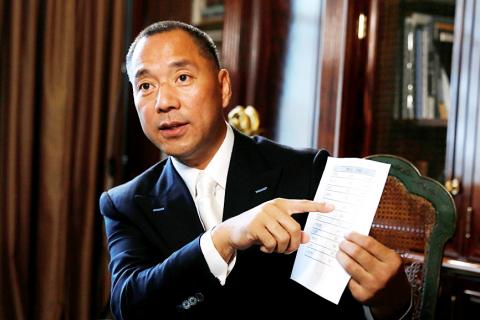Chinese tycoon Guo Wengui (郭文貴) yesterday said that China had monitored the private lives of former president Ma Ying-jeou (馬英九) and his two daughters, putting pressure on Ma to submit to Beijing’s every wish, including imprisoning former president Chen Shui-bian (陳水扁).
Guo, a controversial real-estate developer, on Monday uploaded a video to YouTube and Facebook in which he discussed a meeting he said he had in 2008 with an unnamed Chinese who was then a high-ranking officer in the Chinese People’s Liberation Army General Political Department.
Ma won his first term as president that year.

Photo: Reuters
Guo said he asked the official whether China would be able to “rein Ma in,” to which the official replied: “No doubt we can control him. He will listen to us 100 percent.”
When asked to expound on China’s “control” over Ma, Guo quoted the official as saying: “Ma will redefine the [so-called] 1992 consensus during his term and develop closer economic ties between Taiwan and China. Our economic carrots will definitely take effect.”
Ma would definitely imprison Chen on Beijing’s instruction, which was China’s move to “intimidate” the Democratic Progressive Party, Guo quoted the official as saying.
“We have monitored Ma’s private life and his two daughters for many years,” the official added. “He would not say a word. He will do whatever we want him to do.”
“His every move is under our eyes and so are his two daughters,” the official said.
When asked what Beijing would do if Ma refused to cooperate, Guo said the official told him that Ma would not refuse, as Beijing had a plan in store that would “destroy” Ma.
Guo said that in retrospect, he realized that everything the official said had played out during Ma’s time in office, citing his “audacious” policies to increase economic ties with China and his “radical” imprisonment of Chen.
“I welcome Ma to press charges against me. I would be happy to testify in a Taiwanese court of law or go to Taiwan to present the evidence,” he said.
Guo also spoke about three strategies formulated by China to rein in Taiwan and Hong Kong, which he said would inflict “more damage than a nuclear weapon.”
The first is China’s manipulation of information in Taiwanese and Hong Kong stock exchanges and politics, including distorting financial information and imprisoning Chen and former Hong Kong chief executive Donald Tsang (曾蔭權) — all of which transpired according to Beijing’s design, he said.
The second strategy involves filming businesspeople and officials gambling or accepting sexual favors and using the footage to blackmail them.
Another strategy is deceiving businesspeople into believing they are exempted from paying taxes when conducting business in China and then threatening to prosecute them over tax evasion unless they promise to carry out China’s plans to “corrupt” officials at home, Guo said.
Ma’s office spokeswoman Hsu Chiao-hsin (徐巧芯) said that people should not get worked up over unfounded claims.
“All the allegations are imagined,” she said.

NEXT GENERATION: The four plants in the Central Taiwan Science Park, designated Fab 25, would consist of four 1.4-nanometer wafer manufacturing plants, TSMC said Taiwan Semiconductor Manufacturing Co (TSMC, 台積電) plans to begin construction of four new plants later this year, with the aim to officially launch production of 2-nanometer semiconductor wafers by late 2028, Central Taiwan Science Park Bureau director-general Hsu Maw-shin (許茂新) said. Hsu made the announcement at an event on Friday evening celebrating the Central Taiwan Science Park’s 22nd anniversary. The second phase of the park’s expansion would commence with the initial construction of water detention ponds and other structures aimed at soil and water conservation, Hsu said. TSMC has officially leased the land, with the Central Taiwan Science Park having handed over the

The Philippines is working behind the scenes to enhance its defensive cooperation with Taiwan, the Washington Post said in a report published on Monday. “It would be hiding from the obvious to say that Taiwan’s security will not affect us,” Philippine Secretary of National Defense Gilbert Teodoro Jr told the paper in an interview on Thursday last week. Although there has been no formal change to the Philippines’ diplomatic stance on recognizing Taiwan, Manila is increasingly concerned about Chinese encroachment in the South China Sea, the report said. The number of Chinese vessels in the seas around the Philippines, as well as Chinese

AUKUS: The Australian Ambassador to the US said his country is working with the Pentagon and he is confident that submarine issues will be resolved Australian Ambassador to the US Kevin Rudd on Friday said that if Taiwan were to fall to China’s occupation, it would unleash China’s military capacities and capabilities more broadly. He also said his country is working with the Pentagon on the US Department of Defense’s review of the AUKUS submarine project and is confident that all issues raised will be resolved. Rudd, who served as Australian prime minister from 2007 to 2010 and for three months in 2013, made the remarks at the Aspen Security Forum in Colorado and stressed the longstanding US-Australia alliance and his close relationship with the US Undersecretary

‘WORLD WAR III’: Republican Representative Marjorie Taylor Greene said the aid would inflame tensions, but her amendment was rejected 421 votes against six The US House of Representatives on Friday passed the Department of Defense Appropriations Act for fiscal 2026, which includes US$500 million for Taiwan. The bill, which totals US$831.5 billion in discretionary spending, passed in a 221-209 vote. According to the bill, the funds for Taiwan would be administered by the US Defense Security Cooperation Agency and would remain available through Sept. 30, 2027, for the Taiwan Security Cooperation Initiative. The legislation authorizes the US Secretary of Defense, with the agreement of the US Secretary of State, to use the funds to assist Taiwan in procuring defense articles and services, and military training. Republican Representative